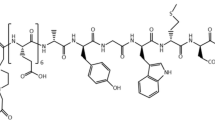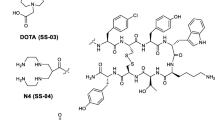Abstract.
Receptors for regulatory peptides such as somatostatin or vasoactive intestinal polypeptide are expressed by a number of human neoplasms and can be visualized in vivo with peptide receptor scintigraphy. Recently, the CCK-B receptor, which binds both gastrin and cholecystokinin with high affinity, was shown using in vitro methods to be overexpressed in a number of human tumor tissues, including medullary thyroid carcinomas, small cell lung cancers, astrocytomas, gastrointestinal tumors, and stromal ovarian cancers. In the present study, we have designed novel, unsulfated CCK octapeptide analogs linked to the metal chelating DTPA and DOTA, and have tested them for their binding affinity to CCK-B receptor-positive tissue from human tumors: The most potent compounds assayed were DTPA-[Nle28,31]-CCK(26–33) (MP2286) and DTPA-[d-Asp26,Nle28,31]-CCK(26–33) (MP2288) with an IC50 of 1.5 nM. For comparison, analogs with C-terminal DTPA, such as [Nle28,31,Aphe33(p-NH-DTPA)]-CCK(26–33) and CCK-(26–33)-NH(CH2)2 NH-DTPA, had an IC50 of >100 nM. DOTA-[d-Asp26,Nle28,31]-CCK(26–33) had an IC50 of 3.9 nM. The compounds were selective for CCK-B receptors as they did not bind with high affinity to CCK-A receptors expressed in human tumors (meningiomas or gastroenteropancreatic tumors). In vivo rat biodistribution studies with indium-111 labeled MP2286 and MP2288 showed that the primary mode of clearance was renal, and the primary sites of uptake (% ID/g 24 h p.i.) were kidneys (0.270 and 0.262, respectively) and the gastrointestinal tract. The CCK-B receptor-expressing gastric mucosa showed specific in vivo accumulation of 111In-labeled MP2288 which could be blocked in the presence of excess unlabeled MP2288. 111In-labeled MP2286 and MP2288 were also found to be stable in human plasma whereas both compounds were degraded in urine (>40% after 3 h at 37°C). The affinity, specificity, biodistribution, and stability of these two DTPA-CCK analogs indicate that these compounds have substantial promise for use in the in vivo visualization of CCK-B receptor-expressing tumors.
Similar content being viewed by others
Author information
Authors and Affiliations
Additional information
Received 22 December 1997 and in revised form 28 January 1998
Rights and permissions
About this article
Cite this article
Reubi, J., Waser, B., Schaer, J. et al. Unsulfated DTPA- and DOTA-CCK analogs as specific high-affinity ligands for CCK-B receptor-expressing human and rat tissues in vitro and in vivo. Eur J Nucl Med 25, 481–490 (1998). https://doi.org/10.1007/s002590050247
Issue Date:
DOI: https://doi.org/10.1007/s002590050247




